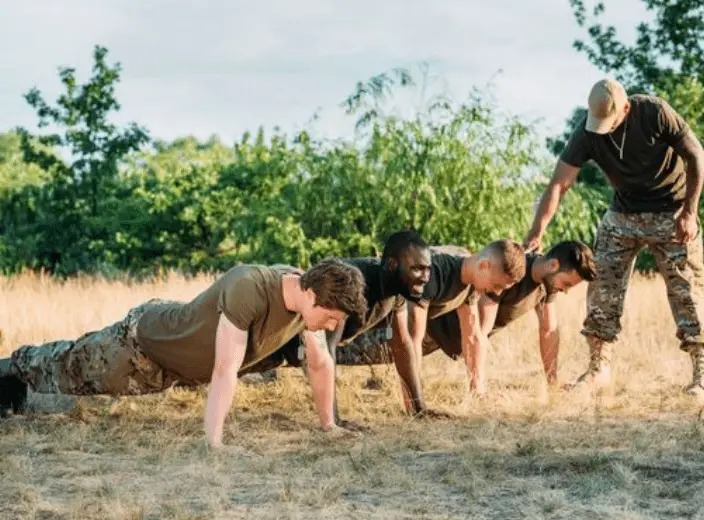If you plan to join the US military, that means basic training is in your near future. And you might have heard stories that make basic training sound pretty scary. But how hard is basic training in reality?
The short answer is that basic training is no walk in the park, but you can survive and even thrive if you go into it with preparation and the right attitude.
What Makes Basic Training Tough?
In basic training, adversity comes from multiple sources. By themselves, none of them should be all that bad, but in combination, they can start to add up.
Here are the main reasons basic training is difficult for most recruits.
The Heat
The US Army has five basic training locations in the United States. They are Fort Benning in Georgia, Fort Jackson in South Carolina, Fort Knox in Kentucky, Fort Leonard Wood in Missouri, and Fort Sill in Oklahoma.
Depending on when on the calendar your basic falls, you may be experiencing heat that you’re not accustomed to. This is especially true if you end up in Georgia and you grew up in a more northern state.
And the heat can be especially tough to deal with because of the next factor.
Constant Exercise
The first few weeks of basic training, in particular, are heavy on the calisthenics. Expect to do lots of running, marching, and pushups.
Later weeks of basic training dial down the physical intensity (though new challenges replace it), but especially at the start, you will be expected to stand up to a fairly grueling exercise regime.
This is an area where you can tilt the odds in your favor, though. Before going to basic training, consider any or all of the following:
Make sure you are comfortable running at least a few miles, as well as running sprints.
Be sure you can do pushups for at least two minutes straight. You will be doing pushups regularly especially during the first week of basic training, so practicing this exercise is a great idea.
If you are a smoker, consider quitting at least a few months before you head to basic training.
When it comes to both the heat and exercise, the key to making it through is mental toughness. Basic training won’t push you beyond your physical limits. But you will probably come right up against those limits.
If you have an attitude that you won’t allow yourself to quit, you will find the strength to endure the tough times. Each day, each exercise or activity, you need to keep your mindset focused on the end goal of passing basic training.
The Schedule
If the thought of waking up at 4:30 am each morning is frightening, you may have some adjusting to do to make it through basic training.
When you join the army, you’re on the army’s schedule, not yours. That means you wake up at the crack of dawn and do what you’re told during the day. You may also have night patrols as basic training goes on.
Coming to terms with the schedule isn’t difficult if you already live a regimented life. But if you’re used to setting your schedule, you’re in for a change during basic training.
Discipline
If you plan to join the US military, that means basic training is in your near future. And you might have heard stories that make basic training sound pretty scary. But how hard is basic training in reality?
The short answer is that basic training is no walk in the park, but you can survive and even thrive if you go into it with preparation and the right attitude.
The final main factor in making basic training tough is the fact that you are expected to do what you’re told at all times. The army is not a democracy, and as a recruit, you are at the bottom of the chain of command.
Especially in the first couple of weeks, expect to be told in no uncertain terms what to do and how to do it. Your drill sergeant will probably find fault with the way you do things when you first begin training. Expect to have to do pushups as a result.
If you go into basic training with the idea that you’re a special case and the rules don’t apply to you, that’s going to be a problem. You’re there to learn from scratch just like everyone else.
In the end, basic training can be anywhere from a moderately difficult experience to one of the toughest things you’ve ever been through. And a lot of it comes down to you.
If you’re in better physical shape, it’s probably going to be easier for you. But the single biggest factor in how hard is basic training is your mentality and attitude.
If you aren’t fully committed and you give yourself room to quit, your odds of quitting go up. But if you approach basic training as a challenge that you’re not going to back down from, you have every chance of making it through basic training with pride.

